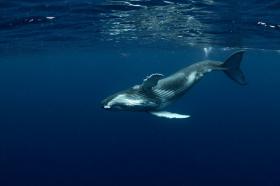Alarming report on the health of our oceans
Marine Species Have Been Cut in Half in Just 40 Years
- by Alicia Graef
- September 18, 2015

The sheer vastness of the oceans on this planet make it seem almost impossible that our actions could bring them to the point of no return, but a new report has found that we are causing an alarming decline of marine ecosystems and the species who rely on them.
According to the World Wildlife Fund‘s (WWF) recently released Living Blue Planet Report, marine populations have declined by an astonishing 49 percent between 1970 and 2012, with with some fish species, including tuna, declining by almost 75 percent.
The report is based on trends of 5,829 populations of 1,234 mammal, bird, reptile and fish species found in the Living Planet Index, which is maintained by the Zoological Society of London (ZSL).
“The ocean works hard in the background to keep us alive, generating half of the world’s oxygen and absorbing almost a third of the carbon dioxide produced from burning fossil fuels. It also feeds billions of people around the globe, some of whom rely solely on the oceans to survive. These devastating figures reveal how quickly human beings are changing the wildlife in our oceans and are a stark warning of the problems we might face as a result,” said Professor Ken Norris, Director of Science at ZSL.
The dramatic decrease is unsurprisingly driven mainly by human activities ranging from overfishing, resource extraction, pollution and development to climate change, which is causing warming and acidification.
While fish are declining at a worrying rate, they’re not the only ones we should be worried about. The report also explores the impact losing coral reefs, mangroves and seagrasses would have not only on the species who rely on them for food and shelter, but on us.
The loss of marine life threatens food security and the livelihoods of coastal communities who depend on healthy ecosystems, in addition to impacting the ever-growing tourism industry.
Conservationists hope that raising awareness about the devastating impact we’re having also means there’s still hope we can work to change course before it’s too late.
WWF and ZSL both point to the need for making immediate changes, including increasing Marine Protected Areas, which could have huge environmental and economic benefits well into the future. Currently, less than 4 percent of the earth’s oceans have been protected.
World leaders will meet later this month at the United Nations headquarters in New York City to agree on a set of Sustainable Development Goals (SDGs), one of which focuses specifically on conserving the ocean. They’ll also meet again later this year in Paris for the United Nations Climate Change Conference, where they will try to reach a global agreement to reduce greenhouse gas emissions.
“The good news is there are abundant opportunities to reverse these trends,” said Brad Ack, senior vice president for oceans at WWF. “Stopping black market fishing, protecting coral reefs, mangroves and other critical ocean habitats, and striking a deal in Paris to slash carbon pollution are all good for the ocean, the economy, and people. Now is the time for the US and other world players to lead on these important opportunities.”
For more info, check out the Living Blue Planet Report.
Disclaimer: The views expressed above are solely those of the author
and may not reflect those of
Care2, Inc., its employees or advertisers.
http://www.care2.com/causes/marine-species-have-been-cut-in-half-in-just-40-years.html#ixzz3mFZ99EKo